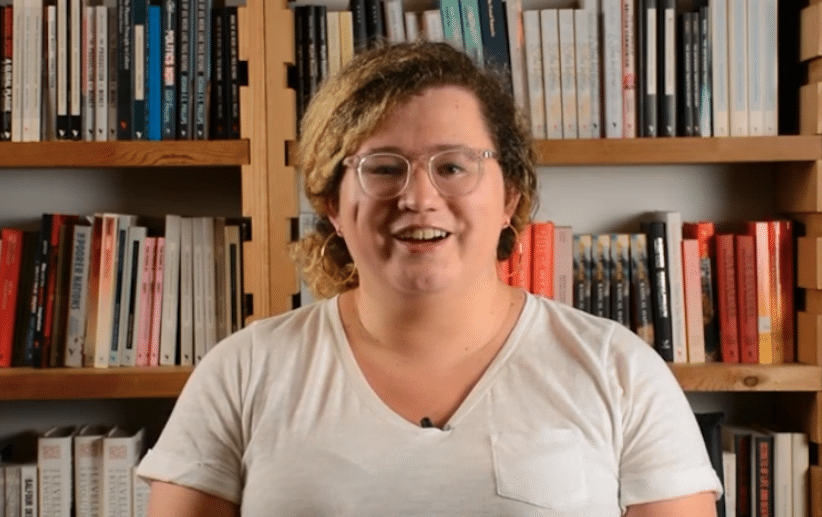Andrea Long Chu, a male who identifies as a transgender woman, was awarded the Pulitzer Prize for criticism for “book reviews that scrutinize authors as well as their works, using multiple cultural lenses to explore some of society’s most fraught topics.”
Chu’s work, however, is decidedly more controversial than the Pulitzer committee at Columbia University’s brief statement would lead the average reader to believe. Our Sunday Visitor reached out to Professor Angela Franks, a Catholic expert on contemporary issues on gender and identity to discuss the ideological background of the controversial award.
Reader advisory: This interview, owing to the subject matter treated by Andrea Long Chu, contains sexual references that some readers may find offensive and has been edited for length and clarity.
Our Sunday Visitor: What was your initial reaction to seeing the news that Chu had been awarded the Pulitzer Prize?
Angela Franks: I was surprised, but then as I thought about it, not so surprised. It did seem to make a certain kind of sense, given our current climate. Some people have weighed in and implied that Chu is a bad writer, but I actually don’t think that’s the case. I think that he’s quite clever and can be a very funny, very insightful writer. But obviously there’s a lot of background baggage that goes into picking him as a prize winner. I think that in part he was picked for exactly that baggage with the kind of trans theory that he promotes.
Our Sunday Visitor: For a Catholic, what are the most difficult aspects of the trans theory that he’s advancing? In other words, if someone is just hearing about a transgender author winning a Pulitzer, what should they know about Chu and his work?
Franks: It’s a little bit hard to talk about it for a Catholic publication. In fact I wrote a review of his book but did not address many of my concerns directly because they’re very pornographic. At the heart of the problem is that Chu acknowledges that a certain kind of pornography made him trans. Chu acknowledges that he discovered his transgender identity through a deviant pornography, which indulged a particular sexual fetish.
Chu advances a gender theory that is directly derived from pornography. And with this, as really with all pornography, but especially with the kind of pornography Chu fell into, treats the woman as something passive. She is considered a passive receptacle for other people’s desire and that is a misogynistic, degrading and extremely negative understanding of the woman.
But it’s interesting that even in the mess of that theory, Chu gets close to some truth. So I think that makes Chu a much more interesting gender theorist than your average gender theory Ph.D. He says a lot of uncomfortable truths that in fact made him an enemy within the LGBTQ rights circles. One of his breakout pieces was to say in the New York Times that his new female anatomy would not make him happy. Chu says the quiet part out loud. In fact, we know from psychological studies that medicalized gender transition procedures do not make people happy, and Chu says, “but I want it anyway.” So we have a very, very problematic kind of theory here that’s rooted in pornography, on the one hand, but on the other hand, Chu does recognize some truths and says them, which is better than a lot of gender theories that are out there.
Our Sunday Visitor: This award follows on a kind of trend of honors that we’ve seen being awarded to men. On International Women’s Day this year, for example, the White House honored a man at the “International Women of Courage Awards Ceremony.” What’s the effect of distributing this kind of award that undermines women’s spaces and an authentic understanding of feminism?
Franks: It’s a phenomenon that I sometimes tartly refer to saying, “Men can be women, better than women.” That really is the message that’s being sent.
A lot of just ordinary people seem to be responding very negatively to this Pulitzer. Ordinary people are very upset by this message that not only is it a man that we’re honoring as supposedly a woman, but also because the kind of femininity that’s being elevated as a model is very superficial. It tends to be focused on appearances. One of Caitlyn Jenner’s memorable lines was “the hardest thing about being a woman is deciding what to wear.” That has not been my experience of womanhood, that the deepest troubles of womanhood or the deepest challenges are rooted in my appearance.
The gender theory model views womanhood as something fundamentally superficial. It involves makeup; it involves being “cutesy” with your friends; it’s an affect that’s put on. You can see that with Dylan Mulvaney. For his part, Chu has said things like that: I wanted to be a woman for the mascara and the lipstick and the crying at movies and so forth. This is not feminism, even though this is aligned very often with supposedly progressive movements.
In theory, there is an alliance between progressive feminism and transgenderism, but in fact transgenderism offers little more than a very debasing take on what it means to be a woman. It’s bad for feminism, period, but in particular for Catholic feminism. What we try to do as Catholics is what my friend Erika Bachiochi calls sex realism. We recognize that the sexes are created by God, and that as human beings we are dimorphic, really sexed as either male or female and that there’s a goodness to this created order, which is a goodness that goes a lot deeper than appearance. This goodness goes a lot deeper even than power or freedom (freedom and rights are obviously good things), but it has to do with the fruitfulness of humanity imitating God’s creative fruitfulness.
I was reflecting on this because one of the outrageous quotes by Chu that’s making the internet meme rounds makes a mockery of female anatomy. This is a person who has no idea what to do with essential ideas about human generation. Reproduction is obviously not entering into his thoughts at all, and that is a pornified vision of sexuality and the two sexes. Reproduction is irrelevant for Chu. It’s worse than irrelevant. It’s a problem. In fact, that’s the deeper problem here: maleness and femaleness is precisely about our orientation toward generative fruitfulness, whether a female fruitfulness or a male fruitfulness, and that is completely absent in this way of thinking about gender.
Our Sunday Visitor: What are we to make of this latest controversy? Culturally it seems like this is just one more institution that we can no longer take seriously. The Pulitzer is America’s most renowned prize in journalism and the creative arts, but now it seems to have succumbed to ideology. Is there anything we can do about it?
Franks: I encourage people who are upset about this to, in a thoughtful way, make their feelings and thoughts known. I think that there is a real groundswell of discontent with the trans regime. It’s not just Catholics. It’s not just Christians. It’s a lot of women. I think we actually have a lot of allies on this issue across the ideological spectrum. So I encourage people not to feel bullied and cowed and not to believe that they’re in the minority, because in fact they are not.
There’s recent polling that came out in the Washington Post, which I think demonstrates that there’s a sizable majority out there. I think we should continue to make our thoughts and feelings heard in polite ways and focus on the next generation. We need to be communicating the truth about these matters to kids, especially those who are very vulnerable because of how contagious this is on social media. The best way forward is to work to help the people who are growing up right now to develop a sense of acceptance of their bodies. That’s something I think we all have to work on, acceptance of our bodies, love for the sexed bodies that God gave us.





